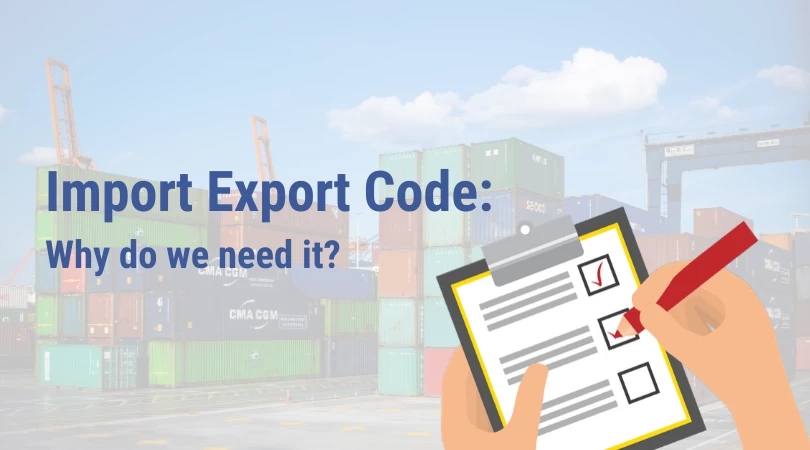In the present era of increasing competition, businesses, in order to survive their competitors prevailing in the domestic market, are stepping out of their comfort zone. Moreover, with continuous innovations and generation of new ideas and thoughts in business altogether with the emergence of E-commerce, business operating in local areas finds it significant to operate worldwide by stepping abroad. On the other hand, there are several ways to go beyond the domestic level, such as the amalgamation with foreign brands, the opening of a franchisee in abroad, starting a subsidiary or a branch office abroad, or by way of import-export business. Pursuing business at a global level is not everyone’s cup of tea.
Import Export Code Registration (IEC) is allotted by the Director-General of Foreign Trade (DGFT), Department of Commerce. Import Export Code is basically a ten-digit number which is needed by every person involved in Export and Import Business. On the other hand, we can also say that this code is needed by every person who is occupied in the business of selling goods or services worldwide. Also, every business dealing in the foreign transfer is needed to obtain an IEC (Import Export Code) number. Lastly, Registration of IEC can easily be done digitally. Hence, there is no need to visit DGFT (Director General of Foreign Trade).
The Need for Import Export Code
Import Export Code (IEC) is a unique ten-digit number allotted to any person or company by the DGFT (Directorate General of Foreign Trade). Moreover, it is functional under the Ministry of Commerce and Industry (MOCI) so, that they can easily and smoothly carry out their Import-Export business in India.
Benefits of Import Export Code Registration
It acts as a license or permission for Importing and Exporting of goods and also as a primary proof for a firm working as an Importer or Exporter in India.
It is submitted to several government authorities to acquire benefits regarding their export and import from the customs, DGFT (Directorate General of Foreign Trade), Export Promotion Council etc.
It also provides the details regarding the dealer code together with the details of the port from where concerned goods are being imported and exported.
To obtain online IEC (Import Export Code) registration, full required information and details are to be furnished concerning the goods that will be imported or exported in India.
The Import Export Code shall be valid for all the divisions or units and factories mentioned on the IEC number.
With IEC, goods are easily cleared from the customs authorities.
It also helps in minimizing the transport of illegal goods.
Features of Import Export Code
Business Expansion
Benefits of Government schemes
Subsidies
Lifetime Validity
Return Filing
Requirements of Import Export Code Registration
In India, Import Export Code Registration is needed to be obtained by anyone who is willing to start an import or export business. Further, IEC is a 10-digit code allotted by the Directorate General of Foreign Trade (DGFT) online. Furthermore, neither the Merchants can operate without holding valid Import Export Code, nor the exporters are eligible to claim benefits provided under the export schemes without such code. Following are the scenarios where IEC is needed –
Import Export Code is demanded by the customs authorities in case the concerned importer clears his shipment from the customs authorities.
Import Export Code is needed when the importer makes a payment abroad by way of his bank, and such bank needs the IEC code allotted to that importer.
Import Export Code is required by the customs authorities when the exporter is willing to send his shipments.
Import Export Code is required in the case where any foreign payment is sent to exporter directly into his bank account for the export made.
For availing various advantages and benefits from DGFT (Directorate General of Foreign Trade), customs authorities, export promotion council, and any such other statutory body.
Documents Required for Import Export Code Registration
Following are the Documents required in the Process of IEC Registration -
PAN number
Identity Proof
Ownership Proof (Rent Agreement in the case of rented property)
Banker's Certificate
Current Bank Account
Company's Cover Letter for the allotment of IEC number
Documents required in case the IEC number is Lost or Misplaced?
If in case the Import Export Code number is lost or misplaced, then a request will be made to the issuing authority in order to grant a duplicate copy of the Import Export Code number. Following are the listed documents required to be accompanied for the purpose of issuance of duplicate IEC number –
For the issuance of duplicate IEC (Import Export Code) number, a request letter is to be drafted on the letterhead
Application form as per Appendix 2 and 3
Copy of IEC (Import Export Code) number
Copy of FIR (First Information Code)
Affidavit on a duly notarized stamp paper
Challan copy or DD (Demand Draft) in favour of JT. DGFT (Directorate General of Foreign Trade
A self-addressed envelope with the postage stamp.
Online Procedure for obtaining IEC Registration
Before applying for the Import Export Code (IEC) Registration, it is necessary to check whether an individual is qualified for obtaining IEC code or not. In case the person is qualified to obtain IEC Registration following is the process to apply for it online –
Firstly, complete the Form 2A by filling in all the required details according to the prescribed “Aayaat Niryaat” format
Now, file the completed form online to (Directorate General of Foreign Trade) DGFT
Next step is to annex the following listed required documents with the form -
• PAN card details of an applicant
• Copy of any one of the following Ids allotted by Government such as the Driving License or the Aadhar card or the Voter Id
• Certificate of Incorporation in the case of a company
• Partnership deed in the case where the applicant is a partnership firm
• Details of the personal bank account or the company’s current account
• Copy of the cancelled cheque
• Address proof of the area where the registered office is located. Address Proof can be provided in the form of an electricity bill or the rent agreement or the registry etc.
Once the form is duly completed together with all the required attachments, then the applicant concerned needs to attach his DSC (Digital Signature Certificate) to such form and also file an online application to DGFT (Directorate General of Foreign Trade) together with paying the amount prescribed as the online fee.
The Appropriate Authority, after due verification and inspection of the application, shall issue the IEC number on the registered Email Id of the applicant stated on such application.
Surrender of Import Export Code Registration
If in the case, the IEC (Import Export Code) holder does not wish to further operate with the allotted IEC number, then the same can be surrendered by informing the issuing authority. Further, the concerned issuing authority after receiving the information shall cancel the same and transmit it to DGFT (Directorate General of Foreign Trade) for further transmission to the customs authorities and to other regional authorities. This transmission is necessary to intimate every concerned authority about the IEC (Import Export Code) number, which has become inoperative now.
Exemptions under the Import Export Code Registration for the Goods and Services
IEC (Import Export Code) is not obligatory and compulsory for all those traders who have GST (Goods and Service Tax) registration. Also, the following listed are the cases where the exception is granted for not obtaining the IEC -
In the case where the goods or services are imported or exported for personal purposes and are not used for any commercial purpose.
Export or Import of goods or services conducted by the Departments and Ministries or by the Notified Charitable institutions on behalf of the Government of India.





